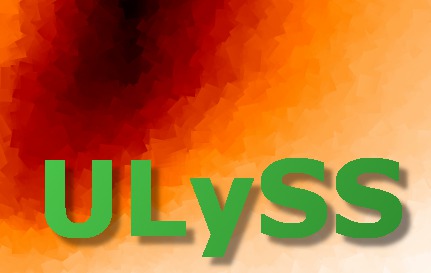
|

|
;+ ; NAME: ; ULY_LSF_SMOOTH ; ; PURPOSE: ; Smooth a LSF file ; ; USAGE: ; uly_lsf_smooth, <lsf_file>, <outfile>, [VDEG=<vdeg>], [SDEG=<sdeg>] ; ; ARGUMENTS: ; <lsf_file>: Name of the file containing the LSF ; ; <outfile>: Name of the file containing the smoothed LSF ; ; KEYWORDS: ; VDEG: degree of polynomial, used to smooth the velocity, default=3 ; SDEG: degree of polynomial, used to smooth the dispersion, default=3 ; H3DEG: degree of polynomial, used to smooth h3, default=3 ; H4DEG: degree of polynomial, used to smooth h4, default=3 ; ; DESCRIPTION: ; Fit the LSF determined by ULY_LSF (cz vs. wave) and (sigma vs. wave) ; respectively with degrees 3 and 2 polynomials and return the ; fitted values as a 'smoothed' LSF. ; ; As it is, this program is obviously a stub on which to build the ; smoothing. We may make a more elaborated version in the future. ; ; DEPENDENCE: ULY_LSF_PLOT, READCOL (by W. Landsman, astrolib) ; ; AUTHOR: Mina Koleva, Philippe Prugniel ; ;- ; CATEGORY: ULY ;------------------------------------------------------------------------------ pro uly_lsf_smooth, lsf_file, outfile, VDEG=vdeg, SDEG=sdeg, H3DEG=h3deg, H4DEG=h4deg if not keyword_set(vdeg) then vdeg=3 if not keyword_set(sdeg) then sdeg=3 if not keyword_set(h3deg) then h3deg=3 if not keyword_set(h4deg) then h4deg=3 lsf = uly_solut_tread(lsf_file, STATUS=status) if status ne 0 then begin message, 'Could not read the LSF file (shall be in solut format)' endif if (size(lsf.losvd, /DIM))[0] ge 2 then begin v = reform(lsf.losvd[0,*]) sig = reform(lsf.losvd[1,*]) endif if (size(lsf.losvd, /DIM))[0] ge 3 then h3 = lsf.losvd[2,*] else h3 = 0*v if (size(lsf.losvd, /DIM))[0] ge 4 then h4 = lsf.losvd[3,*] else h4 = 0*v centrWL = 0*v for k=0,n_elements(lsf)-1 do begin wave_min = sxpar(*(lsf[k]).hdr, 'WAVE_MIN') wave_max = sxpar(*(lsf[k]).hdr, 'WAVE_MAX') centrWL[k] = (wave_min + wave_max) / 2 endfor ; Check if the LSF file was read sucessfully nlsf = n_elements(v) if nlsf eq 0 then begin message, 'Invalid LSF file '+lsf_file endif fitfit = poly_fit(centrwl, v, fix(vdeg), YFIT=vfit) fitfit = poly_fit(centrwl, sig, fix(sdeg), YFIT=sfit) fitfit = poly_fit(centrwl, h3, fix(h3deg), YFIT=h3fit) fitfit = poly_fit(centrwl, h4, fix(h4deg), YFIT=h4fit) lsf.losvd[0,*] = reform(vfit,1,nlsf) lsf.losvd[1,*] = reform(sfit,1,nlsf) if (size(lsf.losvd, /DIM))[0] ge 3 then lsf.losvd[2,*] = reform(h3fit,1,nlsf) if (size(lsf.losvd, /DIM))[0] ge 4 then lsf.losvd[3,*] = reform(h4fit,1,nlsf) if file_test(outfile) then file_delete, outfile for k=0,n_elements(lsf)-1 do uly_solut_twrite, lsf[k], outfile, HEAD=*(lsf[k]).hdr ;; note we can not use forprint which will substitute the next 7 raws ;; because "forprint" is adding by default an extension (.prt) ;forprint, TEXTOUT=outfile, vfit, sfit, h3, h4, centrWL, /SILENT, /noCOMMENT ;openw, lun, outfile, BUFSIZE=0, /GET_LUN ;printf, lun, '# lsf_format=1', FORMAT='(a)' ;printf, lun, '# Smoothed LSF', FORMAT='(a)' ;printf, lun, '# chi2, cz[km/s], e_cz, sigma[km/s], e_sigma, h3, e_h3, h4, e_h4, wl_c[Angstroms], Wstart, Wend', FORMAT='(a)' ;for k = 0, n_elements(v)-1 do begin ; printf, lun, chi2[k], vfit[k], e_v[k], sfit[k], e_sig[k], h3[k], e_h3[k], h4[k], e_h4[k], centrWL[k], wstart[k], wend[k], $ ; FORMAT='(12e14.7)' ;endfor ;close, lun ;free_lun, lun uly_lsf_plot, lsf_file, PSYM=4, LINETHICK=3 uly_lsf_plot, outfile, LINECOLOR='RED', LINETHICK=3, /OVER end ;---end---------------------------------------------------